

English grammar. Cards: GCSE Language Devices. How we teach the arts is as important as the fact we're doing it. I think we should be cautious about the claims we make for the arts in education.

We need to make sure that how we do the art is as important as the fact that we're doing it. After all, it's quite possible to do arts in education in ways which, say, undermine children. For instance, it's quite possible to be authoritarian and dictatorial while doing the arts – and more often than not this will teach children that they should just obey orders or that the arts are about being bossy or snooty. For practitioners of all kinds, I've sketched out a checklist, as much for myself as others, to keep in mind how best to ensure that arts in education is worthwhile for all. Children and young people involved in the arts should: Top Writing Tools of Famous Authors: INFOGRAPHIC. Comedy writing tips for newcomers. The cast of Community … watch TV relentlessly and without guilt, comedy writers are advised.
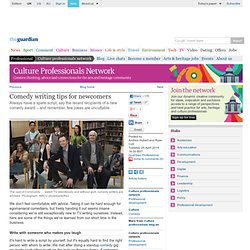
Photograph: NBCU photobank/Rex We don't feel comfortable with advice. Taking it can be hard enough for egomaniacal comedians, but freely handing it out seems insane considering we're still exceptionally new to TV writing ourselves. Instead, here are some of the things we've learned from our short time in the business. Write with someone who makes you laugh It's hard to write a script by yourself, but it's equally hard to find the right person with whom to write. Enter writing competitions.
Writing general. Visual Writing Prompts. Prompt by John T.
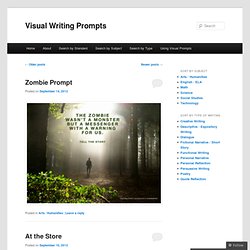
Spencer – Original Article at The Atlantic Cities Prompt by John T. Learning theories. Fun With Words: Glossary of Linguistics and Rhetoric. Ablaut a vowel change that accompanies a change in grammatical function.
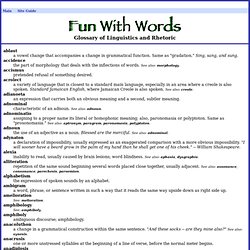
Same as "gradation. " Sing, sang, and sung. Writing by Ear. Shanan Haislip is a full-time business writer, essayist and webmaster.
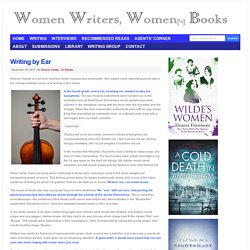
She makes some interesting points about the overlap between music and writing in this article. In the fourth grade, every kid, including me, wanted to play the saxophone. The day musical instruments were handed out, in the orchestra room at East Dover Elementary, all six saxophones were claimed in the stampede, along with the drum sets, the trumpets, and the triangle. When the dust cleared, two instruments were left: an ugly brown thing that resembled an oversized violin, or a dented silver tuba with a bell bigger than my head. Literary Analysis Papers: How to read a poem. Use the guidelines below to learn how to read a poem and understand it.
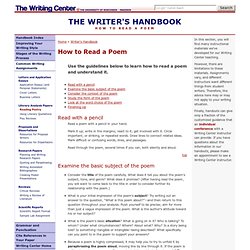
Read with a pencil Read a poem with a pencil in your hand. Mark it up; write in the margins; react to it; get involved with it. Circle important, or striking, or repeated words. Draw lines to connect related ideas. Periodic Table of Storytelling. Five-Man Band. Prepare an AFTER-Duction for the Emcee! - NoSweatPublicSpeaking.com. I’ll bet you’ve experienced this: The master of ceremonies takes the microphone immediately after a speaker finishes their talk and says, in an underwhelming manner,“Thanks for coming.
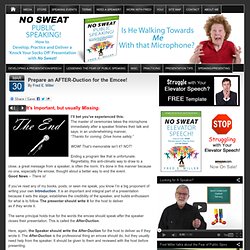
Drive home safely.” WOW! That’s memorable isn’t it? NOT! Ending a program like that is unfortunate. If you’ve read any of my books, posts, or seen me speak, you know I’m a big proponent of writing your own Introduction. The same principal holds true for the words the emcee should speak after the speaker closes their presentation. Here, again, the Speaker should write the After-Duction for the host to deliver as if they wrote it.
The After-Duction serves several purposes: It thanks the speaker for attending the meeting and their presentation.Reinforces something of value from their message.Helps, where appropriate, the speaker sell additional products and services. Lesson ideas. Poetry 180 - How to Read a Poem Out Loud. Julia-Snell_Dialect-Interaction-and-Class-positioning_PRE-PUBLICATION-COPY. Why Teaching Poetry Is So Important - Andrew Simmons. 16 years after enjoying a high school literary education rich in poetry, I am a literature teacher who barely teaches it.
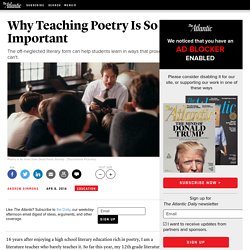
So far this year, my 12th grade literature students have read nearly 200,000 words for my class. Poems have accounted for no more than 100. This is a shame—not just because poetry is important to teach, but also because poetry is important for the teaching of writing and reading. High school poetry suffers from an image problem. Think of Dead Poet’s Society's scenes of red-cheeked lads standing on desks and reciting verse, or of dowdy Dickinson imitators mooning on park benches, filling up journals with noxious chapbook fodder. I have always rejected these clichéd mischaracterizations born of ignorance, bad movies, and uninspired teaching. Yet poetry enables teachers to teach their students how to write, read, and understand any text.
Students who don’t like writing essays may like poetry, with its dearth of fixed rules and its kinship with rap.